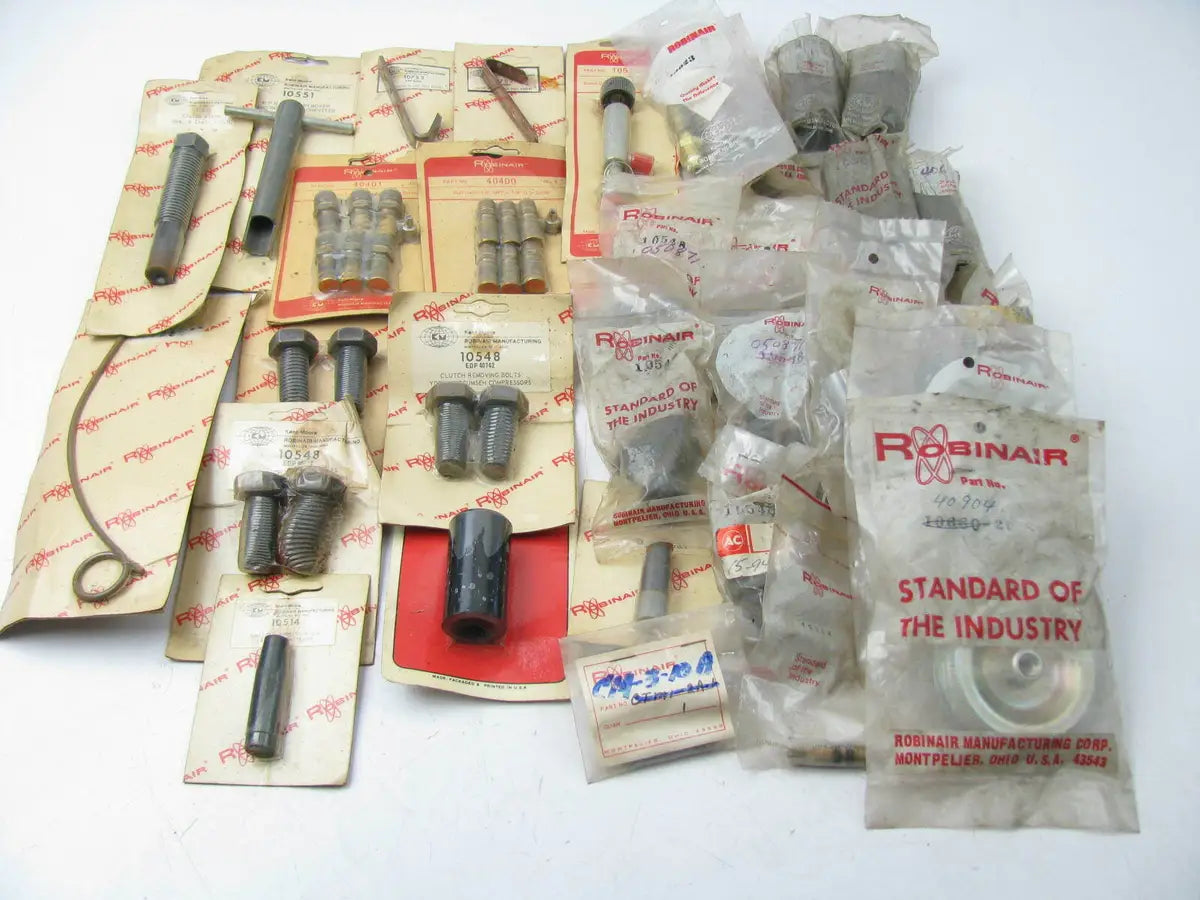Introduction
Regular maintenance of your Robinair parts is essential to ensure their efficiency, longevity, and reliability. Well-maintained equipment not only saves you from costly repairs but also keeps your HVAC system running smoothly. In this guide, we'll cover essential maintenance practices, troubleshooting common issues, and tips to keep your Robinair parts in top shape.

Why Regular Maintenance Matters
Proper maintenance of your Robinair parts offers numerous benefits:
- Extended Lifespan: Regular upkeep can significantly extend the life of your equipment.
- Enhanced Efficiency: Well-maintained tools operate more efficiently, reducing energy consumption and costs.
- Reduced Downtime: Preventative maintenance minimizes unexpected breakdowns and costly downtime.
- Cost Savings: Catching issues early can save you money on major repairs and replacements.

Essential Maintenance Practices
Regular Inspection
Regular inspections are the cornerstone of equipment maintenance. Schedule monthly check-ups to identify any potential issues early.
Key Areas to Inspect:
- Belts and Pulleys: Check for wear and tear.
- Electrical Connections: Ensure all connections are secure and free of corrosion.
- Lubrication: Ensure moving parts are well-lubricated to reduce friction and wear.
Cleaning Components
Keeping your equipment clean is crucial for optimal performance.
Cleaning Tips:
- Filters: Replace or clean air filters regularly to prevent dust and debris from clogging the system.
- Cooling Fins: Clean the cooling fins to ensure proper heat dissipation.
- Exterior Surfaces: Wipe down the exterior surfaces to prevent dust buildup.
For more information on specific Robinair parts, check out Robinair Vacuum Pump.
Lubrication
Proper lubrication is essential for reducing friction and preventing wear and tear on moving parts.
Lubrication Tips:
- Oil Levels: Regularly check oil levels and top up as necessary.
- Oil Type: Use the recommended oil type for your Robinair parts.
- Greasing Bearings: Ensure bearings are adequately greased to avoid overheating and wear.
Monitoring Performance
Keep an eye on your equipment's performance to catch any anomalies early.
Performance Metrics to Monitor
When it comes to maintaining the optimal functionality of your equipment, it’s essential to keep a close eye on several performance metrics. Below are key metrics to monitor regularly so your equipment operates efficiently and reliably.
1. Pressure Levels:
Maintain gauges within the manufacturer’s range. High pressure can cause leaks/ruptures; low pressure reduces performance.
2. Temperature:
Track operating temperatures to prevent overheating and damage; add cooling or thermal management if needed.
3. Noise Levels:
Investigate abnormal sounds promptly to catch mechanical wear or loose components.
4. Vibration:
Use vibration monitoring to detect imbalance, misalignment, or worn parts.
5. Power Consumption:
Rising draw can signal inefficiency or faults; use it to spot energy-saving opportunities.
6. Flow Rates:
For fluids/gases, verify flow is within spec; deviations may indicate blockages, leaks, or pump issues.
7. Lubrication Levels:
Maintain correct levels; consider auto-lubrication for consistency.
8. Load Levels:
Avoid overloading; stay within manufacturer specifications to protect lifespan.
9. Performance Efficiency:
Compare output vs expected benchmarks; drops often flag underlying issues.
10. Maintenance & Inspection Logs:
Record all activities; review trends to prevent downtime.
For service tools, visit our collection of Robinair products.
Troubleshooting Common Issues
Even with regular maintenance, issues can arise. Here are some common problems and their solutions.
Equipment Not Starting
If your equipment fails to start, it could be due to electrical issues, faulty components, or incorrect settings.
Solutions:
- Check Power Supply: Ensure the equipment is plugged in and receiving power.
- Inspect Electrical Connections: Look for loose or corroded connections.
- Reset the Equipment: Follow the manufacturer's instructions to reset the equipment.
Overheating
Overheating can cause significant damage to your equipment and reduce its efficiency.
Solutions:
- Clean Cooling Fins: Ensure cooling fins are free from dust and debris.
- Check Ventilation: Ensure there is adequate ventilation around the equipment.
- Monitor Oil Levels: Ensure proper lubrication to reduce friction and heat.
Unusual Noises
Unusual noises can indicate a variety of issues, from loose components to internal damage.
Solutions:
- Inspect Belts and Pulleys: Check for wear and proper tension.
- Lubricate Moving Parts: Ensure all moving parts are well-lubricated.
- Seek Professional Help: If the noise persists, consult a professional technician.

Preventative Maintenance Tips
Taking a proactive approach to maintenance can help prevent issues before they arise.
Schedule Regular Maintenance
Set up a regular maintenance schedule and stick to it. Regular check-ups can catch minor issues before they become major problems.
For a comprehensive service pack, see Robinair Air Conditioner Install Service Pack.
Keep a Maintenance Log
Maintain a detailed log of all maintenance activities, including inspections, cleaning, lubrication, and any repairs performed. This log helps track equipment health over time and reveal recurring issues.
Train Your Team
Ensure that your team is well-trained in equipment maintenance procedures. Regular training sessions keep everyone current on best practices and new techniques.
For a complete range of parts and accessories, visit the Robinair Collection.
Client Anecdote
One of our clients, Sarah, runs a busy HVAC service company and relies heavily on her Robinair parts for daily operations. During a routine inspection she noticed a slight performance drop in her vacuum pump, investigated, and found a small hose leak. Fixing it immediately prevented a major breakdown that would have disrupted her schedule. The proactive approach saved significant downtime and repair costs—proof that regular maintenance pays off.
Conclusion
Regular maintenance of your Robinair parts is essential for ensuring their efficiency, reliability, and longevity. By following the practices above, you can prevent common issues, enhance performance, and extend equipment lifespan. A little effort now saves time and money later—keep your kit in top shape and it will serve you for years.

